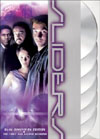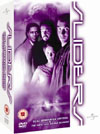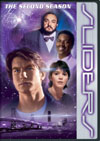The four sliders are in exploration mode at the beginning of this one, which is where most of the best material is. The story's hook and first scene in the police department work very well, but ultimately build anticipation of story angles that the episode won't go near to delivering. Out from under Klingon make-up is actress Gwynyth Walsh, previously famous for playing one of the Duras sisters on Star Trek: The Next Generation. Walsh breathes far more life into the antagonistic role of Chief Police Detective here than was on the page. Good one. Sadly the dialogue is pretty painful during her first interrogation of the sliders. Exactly what story of theirs is it that she finds unbelievable? Did they tell her the complete truth about sliding? Did they give her a half-baked version that leaves out all the scientifically challenging bits? Or did they completely make something up? The audience is left to guess, as this undermotivated bit of overdramatics is interrupted by another which is full of prickly preening for jurisdiction. Although the episode does pick itself up from this lowpoint, it never really does head in an interesting direction afterward. The promise of the premise of course, is that the men should have far more scope and success than normal in being able to select the mate(s) they want, and that they should enjoy their rare status for a while. As with any good dystopian plot, the enjoyment phase should last about half of the length of the episode, while questions about the price being paid slowly seep in. Rembrandt in particular enjoys this arc much more successfully in dozens of Sliders episodes that were about other things. "Love Gods" jumps prematurely to get to the unpleasant phase of dystopian story-telling almost immediately, throwing the plot into the old "Marco Polo" mistake, where the only thing the protagonists want is to escape into the next episode. Doesn't leave us much to look forward to in this episode does it? "Love Gods" does pull a few surprise turns though, going through the expected action beats early and quickly, then spinning off into a few bizarre sub-plots. Quinn's probably leaves the biggest lasting impression, and is something you'd sooner expect to see Rembrandt doing. No doubt the fans are still debating exactly how far Quinn went, which is at least left open for the viewer to decide. However, his dislike of the situation is made plain, going against any hopes the episode may have of selling itself as a fantasy. Wardrobe doesn't help this episode's fantasy prospects either, with regulars and guests dressed for cold, wet Vancouver weather, and stark, tense, political/military situations. Warm and cosy apparently didn't occur to the production staff. Perhaps this episode might have benefitted somewhat from season three's Southern California settings, but again, without knowing how to take advantage of that, it might not work any better either. Stephen Graziano makes his Sliders musical scoring debut on this episode and immediately makes an impression by creating much livelier, more interesting music than his alternate Anthony Marinelli did for most of "Into the Mystic" (story no. 10). Good stuff. The story's conclusion is a bit hokey, and relies on a lot of people being in the right place at the right time - with particular respect to being able to see, catch, or successfully threaten each other..... and then it tries to say that Wade planned it all. Only in fiction can a plan with that many holes and variables go off without a hitch. No great contribution from a heroic Quinn in this one, who merely shows up at the last minute to jump through the wormhole. Ho hum. Well, although this episode's producing writing team of Tony Blake and Paul Jackson will go on to script some of the show's finest episodes, they certainly haven't made a very impressive debut for themselves here. Not to worry though, for their redemption is swift indeed....
This story has become available on DVD. Click on the Amazon symbol for the location nearest you for pricing and availability:
Comments on this article are welcome. You may contact the author from this page:
|









